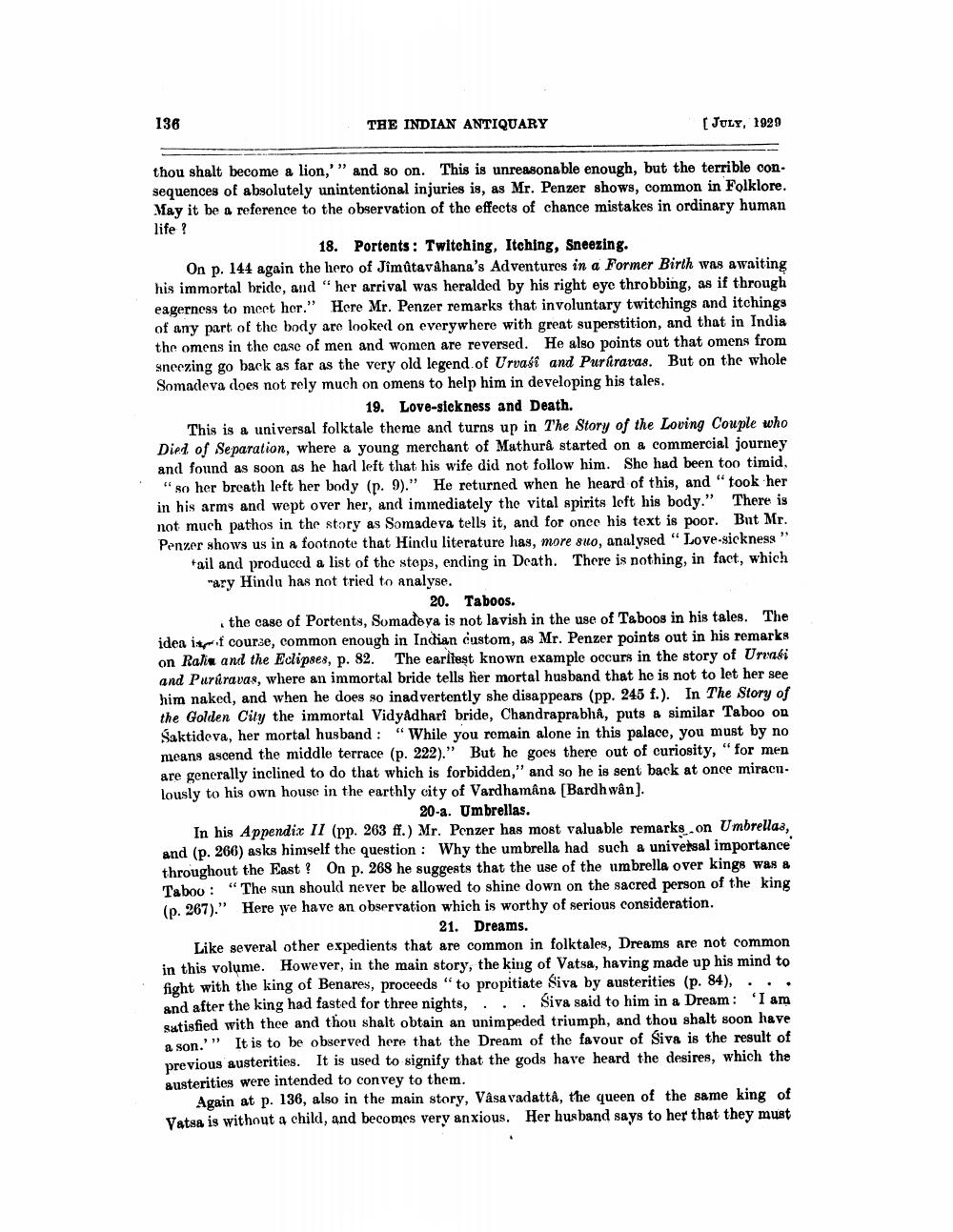________________
136
THE INDIAN ANTIQUARY
[ JULY, 1929
-
thou shalt become a lion,'” and so on. This is unreasonable enough, but the terrible con sequences of absolutely unintentional injuries is, as Mr. Penzer shows, common in Folklore. May it be a reference to the observation of the effects of chance mistakes in ordinary human life?
18. Portents: Twitching, Itching, Sneezing. On p. 144 again the hero of Jîmûtavahana's Adventures in a Former Birth was awaiting his immortal bride, and "her arrival was heralded by his right eye throbbing, as if through eagerness to meet her." Here Mr. Penzer remarks that involuntary twitchings and itchings of any part of the body are looked on everywhere with great superstition, and that in India the omens in the case of men and women are reversed. He also points out that omens from sneezing go back as far as the very old legend of Urvasi and Purararas. But on the whole Somadeva does not rely much on omens to help him in developing his tales.
19. Love-sickness and Death. This is a universal folktale theme and turns up in The Story of the Loving Couple who Died of Separation, where a young merchant of Mathura started on a commercial journey and found as soon as he had left that his wife did not follow him. She had been too timid,
"so her breath left her body (p. 9)." He returned when he heard of this, and "took her in his arms and wept over her, and immediately the vital spirits left his body." There is not much pathos in the story as Somadeva tells it, and for once his text is poor. But Mr. Penzer shows us in a footnote that Hindu literature has, more suo, analysed "Love-sickness"
tail and produced a list of the stops, ending in Death. There is nothing, in fact, which Mary Hindu has not tried to analyse.
20. Taboos. the case of Portents, Somadeya is not lavish in the use of Taboos in his tales. The idea isrif course, common enough in Indian custom, as Mr. Penzer points out in his remarks on Ralin and the Eclipses, p. 82. The earliest known example occurs in the story of Urzsi and Puräravas, where an immortal bride tells her mortal husband that he is not to let her see him naked, and when he does so inadvertently she disappears (pp. 245 f.). In The Story of the Golden Cily the immortal Vidyadhari bride, Chandraprabha, puts & similar Taboo on Saktideva, her mortal husband : “While you remain alone in this palace, you must by no means ascend the middle terrace (p. 222)." But he goes there out of curiosity, "for men are generally inclined to do that which is forbidden," and so he is sent back at once miracu. lously to his own house in the earthly city of Vardhamana (Bardh wân).
20-a. Umbrellas. In his Appendix II (pp. 263 ff.) Mr. Penzer has most valuable remarks on Umbrellas, and (p. 266) asks himself the question: Why the umbrella had such a univetsal importance throughout the East ? On p. 268 he suggests that the use of the umbrella over kings was & Taboo : “The sun should never be allowed to shine down on the sacred person of the king (p. 267)." Here ye have an observation which is worthy of serious consideration.
21. Dreams. Like several other expedients that are common in folktales, Dreams are not common in this volume. However, in the main story, the king of Vatsa, having made up his mind to fight with the king of Benares, proceeds "to propitiate Siva by austerities (p. 84), ... and after the king had fasted for three nights, ... Siva said to him in a Dream: 'I am satisfied with thee and thou shalt obtain an unimpeded triumph, and thou shalt soon have a son.'” It is to be observed here that the Dream of the favour of Siva is the result of previous austerities. It is used to signify that the gods have heard the desires, which the susterities were intended to convey to them.
Again at p. 136, also in the main story, Vâsa vadatta, the queen of the same king of Vatsa is without a child, and becomes very anxious. Her husband says to her that they must




